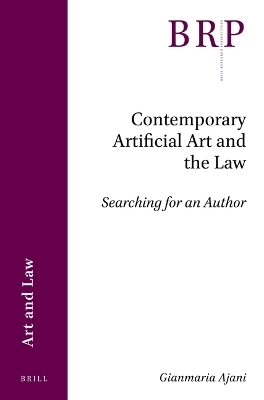
Contemporary Artificial Art and the Law
Searching for an Author
Seiten
2020
Brill (Verlag)
978-90-04-44266-5 (ISBN)
Brill (Verlag)
978-90-04-44266-5 (ISBN)
AI as an “autonomous author” urges the law to rethink authorship. Policy makers should consider a reformative conception of AI in copyright law looking at innovative theories in robot law, where new frames for a legal personhood of artificial agents are proposed.
The advent of Artificial Intelligence (AI) as an “autonomous author” urges the law to rethink authorship, originality, creativity. AI-generated artworks are in search of an author because current copyright laws offer as a solution only public domain or fragile regulatory mechanisms.
During the 20th century visual artists have been posing persistent challenges to the law world: Conceptual Art favoured legal mechanisms alternative to copyright law. The case of AI-art is, however, different: for the first time the artworld is discovering the prospective of an art without human authors.
Rather than preserving the status quo in the law world, policy makers should consider a reformative conception of AI in copyright law and take inspiration from innovative theories in the field of robot law, where new frames for a legal personhood of artificial agents are proposed.
This would have a spill-over effect also on copyright regulations.
The advent of Artificial Intelligence (AI) as an “autonomous author” urges the law to rethink authorship, originality, creativity. AI-generated artworks are in search of an author because current copyright laws offer as a solution only public domain or fragile regulatory mechanisms.
During the 20th century visual artists have been posing persistent challenges to the law world: Conceptual Art favoured legal mechanisms alternative to copyright law. The case of AI-art is, however, different: for the first time the artworld is discovering the prospective of an art without human authors.
Rather than preserving the status quo in the law world, policy makers should consider a reformative conception of AI in copyright law and take inspiration from innovative theories in the field of robot law, where new frames for a legal personhood of artificial agents are proposed.
This would have a spill-over effect also on copyright regulations.
Gianmaria Ajani is Professor of Law & Art at the University of Turin, Italy and past President of the same University. He has published monographs and articles on Legal Theory, Law and Language, Legal Reforms in post-Socialist Countries. He taught EU Law at UC Berkeley. He is Visiting Professor at the University of Bergen.
Contemporary Artificial Art and the Law
Searching for an Author
Gianmaria Ajani
Abstract
Keywords
1 Introduction
2 Artificial Art in Search of an Author
3 Kaleidoscope: Authors and Artworks between Classic Law and the Art World
4 Artificial Authors?
5 “If a Machine Acts as Intelligently as a Human Being Then It Is as Intelligent as a Human Being”
6 Conclusion: “Art Makes Meaning”
Acknowledgments
Bibliography
| Erscheinungsdatum | 25.09.2020 |
|---|---|
| Reihe/Serie | Brill Research Perspectives in Humanities and Social Sciences / Brill Research Perspectives in Art and Law |
| Verlagsort | Leiden |
| Sprache | englisch |
| Maße | 155 x 235 mm |
| Gewicht | 167 g |
| Themenwelt | Kunst / Musik / Theater |
| Informatik ► Theorie / Studium ► Künstliche Intelligenz / Robotik | |
| Recht / Steuern ► Allgemeines / Lexika | |
| Recht / Steuern ► EU / Internationales Recht | |
| Recht / Steuern ► Privatrecht / Bürgerliches Recht ► IT-Recht | |
| ISBN-10 | 90-04-44266-9 / 9004442669 |
| ISBN-13 | 978-90-04-44266-5 / 9789004442665 |
| Zustand | Neuware |
| Haben Sie eine Frage zum Produkt? |
Mehr entdecken
aus dem Bereich
aus dem Bereich
Buch | Softcover (2024)
REDLINE (Verlag)
20,00 €
Eine kurze Geschichte der Informationsnetzwerke von der Steinzeit bis …
Buch | Hardcover (2024)
Penguin (Verlag)
28,00 €


